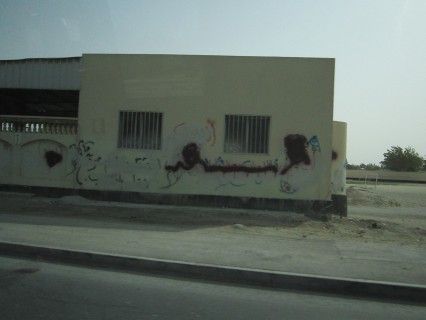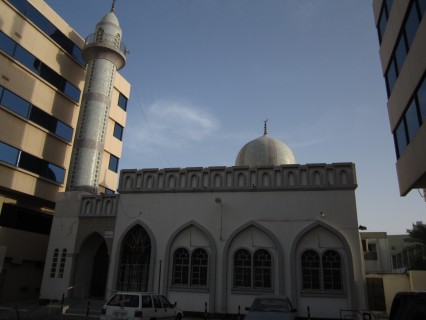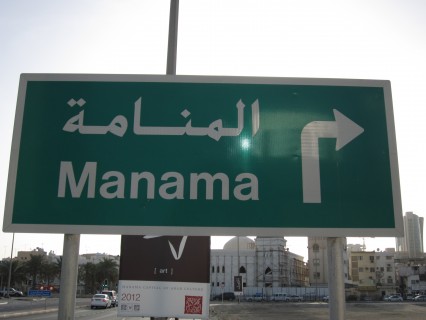[caption id="attachment_101076" align="alignleft" width="300" caption="Anti-regime graffiti is endemic in Bahrain-the government then covers it with red paint, which makes dissent even more obvious"]

[/caption]
Last weekend I was in Bahrain, the small island country off the coast of Saudi Arabia. Bahrain is one of the oldest cultures in the Middle East; it was here that oil was first discovered in the Arabian Gulf; and this kingdom was the first economy to begin diversifying its economy and look to a post-oil future.
I was apprehensive about visiting Bahrain because of the approaching anniversary of the February 14 demonstrations. But first impressions immediately put those insecurities to rest. Forget the cliches about the friendly people (well they are). Unlike its neighbors
Qatar and the
United Arab Emirates, locals can be found doing jobs from driving taxis to working in restaurants. The cars on the highway could very well be in the suburbs of Los Angeles or Sydney--the monster SUVs and sports cars are not as prevalent here as they are in neighboring Gulf countries.
But Bahrainis are doing those jobs, and are often struggling, because unlike its neighboring rulers, Bahrain’s royal family, the Al Khalifa clan, does not share its wealth with its people. And life for many of the 500,000 expats who form half the country’s population is miserable, too. As for oil, many Bahrainis see the country's largest export as a curse. The country was relatively self-sustaining before the petroleum boom, but the industry has left a legacy of pollution and greed, while fresh water springs became polluted and beaches were cordoned off for the few and the privileged.
[caption id="attachment_16699" align="aligncenter" width="426" caption="Anti-regime graffiti then covered in red paint buy the government-which brings more attention to dissent."] [/caption]
“Do you smell it?”
[/caption]
“Do you smell it?”
My introduction to Bahrain’s turmoil was at the Country Club, a collection of restaurants and tourist bungalows just outside the city limits of Manama, Bahrain’s capital. An old friend took me there to introduce his neighbors and buddies, who all noted that for years these restaurants and bars were packed shoulder-to-shoulder on weekends. But the expats who escaped Saudi Arabia for a weekend of drinks with meals and relaxation are no longer coming in hordes. The place was empty. In fact, save for a few couples, we were the only group in both bars we visited. Curiously, as we walked in, I heard what sounded like fireworks in the distance. After sitting down, I immediately was asked a barrage of questions:
“Why isn’t the USA and West doing anything?”
“Don’t people realize this isn’t just a Sunni-Shi’a conflict?”
“Why can’t we just get the respect and dignity we deserve?”
Then immediately everyone started wiggle their fingers under their nostrils, and I was asked, “Do you smell it?” Smell was not the right word. Try sense; my eyes started watering.
(To learn what it is like to be caught in tear gas, read Leon Kaye’s experience here).>
[caption id="attachment_16698" align="aligncenter" width="426" caption="Mosque in Bab al Bahrain, where Leon Kaye was caught in a huge release of tear gas after a demonstration."] [/caption]
Tear Gas, the Evil Incense of Bahrain
[/caption]
Tear Gas, the Evil Incense of Bahrain
Those sounds I heard were not fireworks, but tear gas canisters fired into neighboring villages around Manama. As many people explained during my weekend in Bahrain, soldiers and police officers relentlessly fire tear gas canisters into neighborhoods, and homes, of anyone suspected of leading or participating in the demonstrations against the government--which is not really a government but a corrupt tribe who has ruled the country with an iron fist and a insatiable pocketbook since 1783.
The grievances of the Shi’a (or Shiites) majority include the following: many have been fired from the civil service because of their religion; the lack of access to important military and political positions; constant harassment from law enforcement; jobs that Bahrainis can do are given to expats; and the favorable treatment of Sunnis from other countries.
Then there are the outrages that can happen at anytime: the firing of rubber bullets and tear gas into neighborhoods, often at night; residents cover their windows and doors to keep out the tear gas, only to have officers rip it out and shoot tear gas canisters into their homes anyway; pregnant women
miscarrying as a result of the tear gas assaults and then denied medical care of they are Sunni. Stories of torture are commonplace.
Conducting business is next to impossible here if you do not include the ruling family, specifically Prime Minister His Royal Highness Prince Khalifa bin Salman Al Khalifa. Any projects from new building developments to even a multi-million dollar clean energy project are dashed if the Al Khalifa family does not have a big enough chunk of the profits to which the clan believes it is entitled.
[caption id="attachment_16697" align="aligncenter" width="426" caption="The protests in Manama are this way. Most are announced via Twitter."] [/caption]
[/caption]
For Bahrainis, their options are limited. The Al Khalifa mob has the support of both Saudi Arabia and the United States. The royal family has also
hired a bevy of public relations firms to burnish its image, as well as “tough cop” former Miami police chief
John Timoney. While Timoney bemoans
youth violence, he has been silent about the continued violence that both Bahraini and foreign hired soldiers have inflicted upon the country’s citizens.
What Can Businesses Do, or Should Not Do?
Multinationals conducting business in Bahrain, including those offshore banks that helped to transform the country's economy, must sever any ties with the Al Khalifa family. Some already are, with companies looking to Dubai, Abu Dhabi and Doha as a new home because of the instability resulting from the
Arab Spring. Other businesses like hotels have no choice but to operate as best they can under the circumstances, and
many have been hurt by the turmoil. But companies in many sectors can send a strong message by taking their business out of Bahrain and move them a few hundred miles away to countries that are eager to diversify their economies and offer a better way of life for its people.
Foreign governments will stay mum on Bahrain’s situation, but businesses have got to speak out and show the Al Khalifa family it is in their best interest to share more resources and power with their citizens--or risk having none in the long term. Companies can finally take a stand on human rights issues and show they are serious about corporate social responsibility by avoiding Bahrain. For Bahrainis who have long been ignored by their government, an exodus of foreign businesses would not hurt them any more as the current government because the ruling family does not share such wealth now. Continuing business with the Al Khalifa's only permits the clan to cavort in their huge Manama palaces, London, the South of France and Los Angeles--and in the meantime too many people are denied decent opportunities are are suffering in the meantime.
To track the unfolding events on Twitter, search with the hashtags
#Feb14 or #Bahrain.
Leon Kaye is currently spending a month in the Middle East; next week he is in Qatar. He is the editor of GreenGoPost.com and contributes to Guardian Sustainable Business and Earth911.com. You can follow him on Twitter.
Photos courtesy Leon Kaye.
 [/caption]
Last weekend I was in Bahrain, the small island country off the coast of Saudi Arabia. Bahrain is one of the oldest cultures in the Middle East; it was here that oil was first discovered in the Arabian Gulf; and this kingdom was the first economy to begin diversifying its economy and look to a post-oil future.
I was apprehensive about visiting Bahrain because of the approaching anniversary of the February 14 demonstrations. But first impressions immediately put those insecurities to rest. Forget the cliches about the friendly people (well they are). Unlike its neighbors Qatar and the United Arab Emirates, locals can be found doing jobs from driving taxis to working in restaurants. The cars on the highway could very well be in the suburbs of Los Angeles or Sydney--the monster SUVs and sports cars are not as prevalent here as they are in neighboring Gulf countries.
But Bahrainis are doing those jobs, and are often struggling, because unlike its neighboring rulers, Bahrain’s royal family, the Al Khalifa clan, does not share its wealth with its people. And life for many of the 500,000 expats who form half the country’s population is miserable, too. As for oil, many Bahrainis see the country's largest export as a curse. The country was relatively self-sustaining before the petroleum boom, but the industry has left a legacy of pollution and greed, while fresh water springs became polluted and beaches were cordoned off for the few and the privileged.
[/caption]
Last weekend I was in Bahrain, the small island country off the coast of Saudi Arabia. Bahrain is one of the oldest cultures in the Middle East; it was here that oil was first discovered in the Arabian Gulf; and this kingdom was the first economy to begin diversifying its economy and look to a post-oil future.
I was apprehensive about visiting Bahrain because of the approaching anniversary of the February 14 demonstrations. But first impressions immediately put those insecurities to rest. Forget the cliches about the friendly people (well they are). Unlike its neighbors Qatar and the United Arab Emirates, locals can be found doing jobs from driving taxis to working in restaurants. The cars on the highway could very well be in the suburbs of Los Angeles or Sydney--the monster SUVs and sports cars are not as prevalent here as they are in neighboring Gulf countries.
But Bahrainis are doing those jobs, and are often struggling, because unlike its neighboring rulers, Bahrain’s royal family, the Al Khalifa clan, does not share its wealth with its people. And life for many of the 500,000 expats who form half the country’s population is miserable, too. As for oil, many Bahrainis see the country's largest export as a curse. The country was relatively self-sustaining before the petroleum boom, but the industry has left a legacy of pollution and greed, while fresh water springs became polluted and beaches were cordoned off for the few and the privileged.
 [/caption]
[/caption]
 [/caption]
[/caption]
 [/caption]
[/caption]















